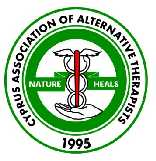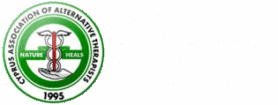 The Cyprus General Council and Register of Alternative Therapists
The Cyprus General Council and Register of Alternative Therapists
- CYPRUS ALTERNATIVE THERAPIES ASSOCIATION
- CYPRUS NATUROPATHIC ASSOCIATION
- CYPRUS TRADITIONAL ACUPUNCTURE ASSOCIATION
Introduction
- The code has been compiled by the Ethics Committee of the Cyprus Council of Alternative & Complementary Medicines (comprised by the above mentioned Natural Health Associations) and relates to the standards of practice of Natural Therapy Consultants of the C.G.C.A.T.
- This Code of Ethics describes the professional standard of conduct expected of Natural Health Practitioners so as to preserve and enhance the reputation of the C.G.C.A.T. practice of natural therapies and to protect the general public.
- The Code applies-to Natural Health Practitioners who are members of the C.G.C.A.T.
- The Ethics Committee reserves the right to amend the Code of Ethics as and when it is deemed necessary.
DUTY OF CARE
- The primary professional duty of a practitioner is to competently assist the patient of optimal health, within the circumstances of the patient’s condition.
- The practitioners shall always maintain the highest standards of professional conduct and duty of care to the patient.
- Under no circumstances shall a practitioner knowingly undertake any action of treatment that would adversely affect the health of the patient or fellow human being.
PROFESSIONAL CONDUCT
- The practitioner shall have respect for the religious, spiritual, political and social views of any individual irrespective of race, age, sex, colour, ethnic origin, differing abilities, sexuality, creed marital status, culture, political views, or social standing.
- Proper conduct must always be paramount in practitioner’s relations with patients.
- Practitioners must behave with courtesy, respect, dignity and discretion. Their attitude must be competent and sympathetic, hopeful, and positive, thus encouraging an uplift in the mental outlook of the patient and a belief in a progression towards good health practices.
- A practitioner can practice only the natural and or traditional therapy disciplines -in which he/she is accredited.
- The practitioner is to recognize a responsibility to give the generally held opinions of the relevant discipline when interpreting and conveying scientific or empirical knowledge to patients or to the general public, and where one presents any personal opinion which is contrary to the generally held opinion of the discipline clearly indicate that this is so.
- A practitioner should not enter into an intimate or sexual relationship with a patient whilst the patient is under their care.
- A practitioner shall not provide false information on documents used for health fund rebate purposes.
- A practitioner shall not use any unsafe or improper practice.
- Practitioners shall at all times show due respect and co-operate with practitioners of other disciplines.
- Practitioners must never claim to ‘CURE’ . The possible effects therapeutic benefits may be described as recovery, but this must never be quarantined.
- Practitioners must never play Medical Doctors, as medical doctors’ work is different to what natural health practitioners are doing.
- As a Natural Health Practitioner you are not medically diagnosing, medically treating patients’ for diseases. Your purpose is to strengthen the hole body, and bring the energy levels to a stage that the body will restore the person’s vitality and imbalanced energy levels or bring improvement of the body function.
- A practitioner shall at no time take in or promote any activity, verbal or otherwise which will reflect improperly or denigrade the standing of the C.G..C.A.T. within the general community or in any professional circles.
- Practitioners should ensure that they are medically, physical and psychologically fit to practice.
- A practitioner should not attend to a patient or clinic whilst under the influence of alcohol, drugs, or other substance that would impair judgment. It would be necessary to be considered inappropriate for a practitioner to smoke or consume tobacco product in the clinical setting.
- Members must take care when explaining procedures, and treatment which they propose to administer, and should recognize the patient’s right to refuse or ignore advice.
- Members must act with consideration concerning fees and justification of treatment.
- Members are expected to refresh their knowledge and techniques by attending appropriate seminars and post-graduate training courses. Failure to engage periodically in a reasonable amount of post-graduate education may be taken into account by the professional Ethics Committee when hearing allegations which call a member’s professional competence into question.
CONFIDENTIALITY
- A Practitioner may not disclose information obtained in confidences from or about a patient unless consent is given.
- Patients records are to be kept confidential at all times and access restricted to the practitioner or assistant, except:
- where consent has been obtained from the patient or guardian, and then only to the extend of the agreed disclosure.
- In an emergency or other urgent situation, where the information may prevent possible injury of the patient or the person.
- Where required to do so by Law.
PATIENT RECORDS
- The public are entitled to expect that a practitioner will maintain a good standard of practice with full records including:
- Name
- Address
- Telephone
- Date of birth
- Details of health history
- Dates of treatment
- Details of remedies prescribed.
ADVERTISING:
- A practitioner shall not advertise or lay claim to secret or exclusive methods of treatment.
- In the advertising of a practitioner’s skills and services, attention should be given to the following:
- Practitioners shall not use titles or descriptions which give the impressions of medical or other qualification to which they are not entitled.
- A practitioner shall only advertise in a proper and professional manner for the purpose of informing the public as to their location details and areas of specialized practice.
STATIONARY
- A practitioner is responsible for the use of their own receipts and their personal receipt books are not to be shared with other practitioners.
BREACH OF CODE OF ETHICS
- A serious breach of any aspect of this Code of Ethics will make the practitioner subject to disciplinary action in accordance with the mechanism described in Complaints Unit and Disciplinary Tribunal of the C.G.C.A.T.
